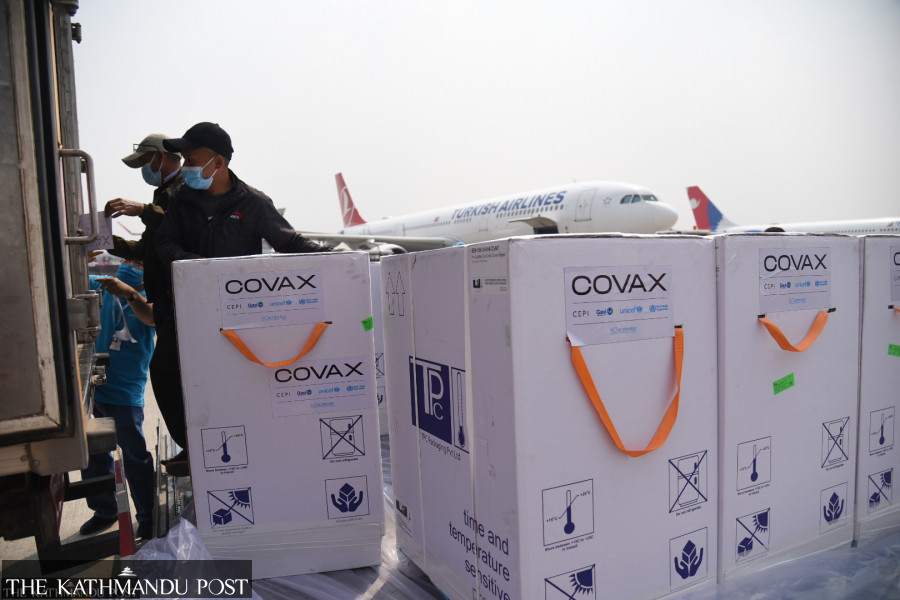Health
Ministry says it rejected millions of COVAX-offered Covid shots with short shelf life
Over four million AstraZeneca doses in government storage expire in April-end.
Arjun Poudel
The Ministry of Health has rejected millions of doses of Covid-19 vaccines, mostly AstraZeneca type, offered by various countries through COVAX as the doses had short shelf life.
Officials said that offers were rejected because it would be challenging to administer the doses, most of which had just around two months of shelf life.
“Yes we refused offers for millions of doses of vaccine because they had short shelf life,” said Dr Dipendra Raman Singh, director general at the Department of Health Services. “It would not be possible to use up the doses that were expiring in 15 days, 25, days and 30 days. And if we are unable to use them all before their expiry then that does not send a positive message.”
Nepal had accepted vaccine doses with just one week of shelf life from Bhutan, and one month of shelf life from the Maldives.
At the time, when Bhutan and Maldives supplied their surplus AstraZeneca doses, Nepal had been struggling to manage the doses to administer to the elderly people above 64 years, who were inoculated with the first doses of the vaccine some four months ago.
“Currently we do not have a vaccine shortage and we need to first use the doses we already have,” said Singh.
Officials at the Management Division under the Department of Health Services said countries including Poland, Latvia and others have offered through COVAX over 10 million doses with shelf life until April.
“Our vaccine storage capacity is also limited,” said Dr Rudra Prasad Marasini, director at the management Division, adding, “We could not accept the offer, as the doses had short shelf life. And we already have millions of doses of AstraZeneca vaccine in stock.”
Health Ministry officials said they would have accepted the doses and would request for delay in shipment, if the doses had several months of shelf life.
The Health Ministry said that over four million doses of AstraZeneca vaccine kept at various storage facilities across the country will expire in April-end.
Likewise, an AstraZeneca batch supplied by COVAX recently too has a shelf life of around two months only.
“Over 2.1 million doses of AstraZeneca vaccine supplied by COVAX recently needs to be used by April,” said Dr Surendra Chaurasia, director at the Logistic Management Section, under the Department of Health Services. “But we will use the doses before their expiration date.”
COVAX, the UN-backed vaccine sharing scheme, on Monday supplied 1,312,080 doses of the AstraZeneca vaccine.
It was the second consignment, which is part of the 2,174,160 doses offered by the facility.
Over 8 million doses were supplied last week.
Nepal so far has received 47,912,000 doses of vaccines, including AstraZeneca, Vero Cell, Moderna, Janssen and Pfizer-BioNTech.
Nepal needs to vaccinate around 26 million of the 29.1 million population, as around three million are children under five years of age. Authorities had decided to inoculate children between five and 11 years but no deal has been reached so far to purchase vaccines for them.
So far, 16,549,489 people, or 56.7 percent of the total population, have been fully immunised against Covid.
The government has committed to inoculating all eligible populations by Mid-April.
Despite having sufficient doses in stock, Nepal’s vaccination drive has remained slow due to several factors including sudden stoppages in vaccination drive owing to shortages, irregular vaccination programme, and bureaucratic hurdles—identity card was mandatory for vaccination until recently–among others.
The Health Ministry has now decided not to seek identity cards for vaccination and eligible people could get inoculated upon self declaration.
Public health experts have long been stressing the need for micro plannings, launching awareness drives and door-to-door campaigns to increase vaccine coverage.
“As the vaccine seems to be the only reliable medium to prevent severity and deaths from infections, authorities should try their best to increase the vaccine coverage,” said Dr Baburam Marasini, former director at the Epidemiology and Disease Control Division.
On Tuesday, 680 people tested positive for Covid—498 in 4,256 polymerase chain reaction tests and 182 in 2,839 antigen tests. In the last 24 hours, two people died of Covid.
Active cases stand at 19,400 throughout the country.




 11.84°C Kathmandu
11.84°C Kathmandu















